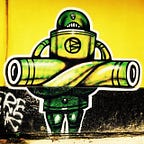Why Kobe is the Antidote for Our Lowest Moments
Remembering the Mamba
Each of us is only one bad day away from rock fucking bottom. It’s not something most of us dwell on, nor should it be. Like Alex Honnold free soloing El Cap, the move is to not look down. But when you do look down and take time to survey the world from a tiny ledge thousands of feet from the ground, you’ll likely be overcome with the realization that one tiny misstep and whoosh, there goes the neighborhood.
We’re each an unexpected diagnosis, an identity theft, a natural disaster or a bottle of pills away from life turning us upside down, holding us by the ankles and shaking us until every happy thought falls out of our ears. Did you know, over half of Americans have fewer than $1,000 saved? 21 million Americans suffer from some form of addiction. A cancer diagnosis happens every 20 seconds. And a cancer diagnosis doesn’t care if you’re a gas station clerk or Oprah. It’s ruthless and indiscriminate, and when something ruthless and indiscriminate strikes it can leave a person crumpled and hopeless.
The fact that we–you, me, all of us–even made it here, to this moment, relatively unscathed, is a full-fledged, Jesus-certified miracle. But not everyone did. Some made it scathed, severely. Others didn’t make it at all.
On January 26th, 2020, in a matter of moments, we added seven more names to the list of those who didn’t make it here, to this moment. A helicopter crashed in southern California. Everyone on board died. Among those in the helicopter were Kobe Bryant and his daughter Gianna.
Those closest to Kobe, his daughter and the other passengers on the flight, hit rock bottom. Hard. And fast.
I was on top of a mountain when I heard Kobe had died. I’d just hopped of a gondola, grabbed my skis and was paying less attention than I should have to the jaw-dropping 360º views surrounding me when my buddy said, “Dude. Kobe died.”
“What? You’re fucking kidding me.” I replied, thinking this was either some strange joke or macabre piece of Internet bullshit.
“No, really. Kobe died.”
Then I heard the people filing off the Gondola behind me chatting something about Kobe. Pretty soon the whole mountain was talking about it. Here we were, all of us, 6,800 feet up a mountain, about to hurtle down it at 45mph, reminded, bluntly, of our own mortality. You ever tried skiing while contemplating death? Trust me, it’s the opposite of flow-inducing.
In the 24 hours after Kobe’s death the world mourned together, mostly in the form of tweets and Instagram stories. Every TV show and podcast talked about what Kobe meant. Every phone screen I glanced at flashed purple and gold. Public grieving was everywhere, all of it warranted.
Internet pandering typically turns me off. Catch twitter on the wrong day and you’ll bear witness to the virtue signaling Olympics — everyone trying to out-woke one another for a spot atop the comments of some celebrity’s post. (Arian Foster aka Bobby Feeno had an interesting take on public pandering, from an athlete’s perspective). But this wasn’t pandering. It was genuine hurt, because someone died who’d played a genuine role in the lives of hundreds of millions of people. For many, like me, it was a distant role, pumped up by Nike marketing dollars and reinforced with every savage dunk. Yeah, I imitated Kobe’s fadeaway on mini basketball hoops hung in my bedroom and yeah, I still mutter “Kobe” under my breath when I toss balled up paper in the trash. Don’t you?
Before he hung ’em up, Kobe had pieced together one of the most storied careers in sports history, inventing and reinventing himself along the way. In many ways he was the first NBA superstar to play an entire career in the era of ubiquitous screens and the Internet. And he knew it, too. So he took the reins of his own narrative. He wouldn’t just show up to shoot commercials, he’d give creative input. He offered in-depth design feedback on his signature shoes. He put out a documentary and myriad other content while playing. He pioneered the player-as-brand mindset that is now common all the way down to the AAU level. He educated and inspired the generation behind him. He navigated superstardom deftly. And yet all the hype and spiffy ads would have meant jack shit if he didn’t back it up on the court. Which he did, thanks to his undeniable talent, born of an undeniable work ethic.
Kobe workouts are the stuff of legend. And if the early mornings in the gym aren’t proof enough of the lengths he’d go to to maximize his physical abilities, the not-so-secret German PRP treatments were.
He matched his physical grit with his dedication to skill development. Some guys had a good spin move. Kobe had a whole bag of spin moves. He had jab steps in different flavors, pump fakes for every occasion, custom made jump stops and step backs that created more space than the big bang. And when he elevated for that vintage, Jordan-inspired fadeaway, it was going in. We knew it. His opponents knew it. He knew it. Nobody was more sure that Kobe’s shot was going in than Kobe was. Why? Because he knew how hard he’d worked to perfect it.
And here is where this little blurb comes full circle, because in Kobe’s work ethic, his mentality, is the antidote to rock bottom. We can’t choose whether we hit rock bottom. Sometimes life hands us lemons. Other times life chucks lemons at us, by the dozen, while we’re on stage, melting down in front of a live audience. But if we develop a mindset of resilience, a Sisyphean constitution, a mamba mentality, it’s impossible to stay at rock bottom for long.
